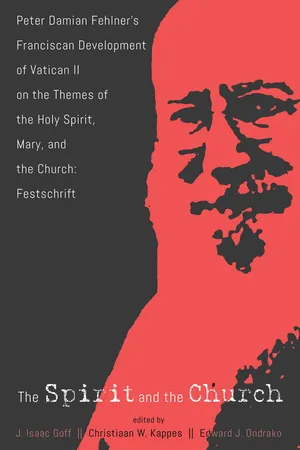
The Spirit and the Church
Peter Damian Fehlner's Franciscan Development of Vatican II on the Themes of the Holy Spirit, Mary, and the Church—Festschrift
- 296 pages
- English
- ePUB (mobile friendly)
- Available on iOS & Android
The Spirit and the Church
Peter Damian Fehlner's Franciscan Development of Vatican II on the Themes of the Holy Spirit, Mary, and the Church—Festschrift
About This Book
The Spirit and the Church celebrates the life and legacy of Peter Damian Fehlner, OFM Conv., who for the past six decades has carried the torch of the Franciscan theological and philosophical vision in the fields of ecclesiology, pneumatology, Mariology, and anthropology. Articles by colleagues, former students, and associates fall into three broad categories, corresponding with several of the main areas in which Fehlner has made a longstanding scholarly contribution: the Church's Magisterium and development of doctrine, anthropology, comma and creation; the relation between Mariology, pneumatology, and ecclesiology; and scholarly seeds planted by Fehlner now being cultivated and harvested by younger scholars. All of the essays in this volume engage with Fehlner, evaluate his contributions, and build upon and expand in new directions the contributions of our honoree. The essays in this volume manifest the contemporary relevance of Fehlner's Franciscan vision in terms of his invitation to renew the theology of the Church in a Marian mode in the light of Vatican II.
Frequently asked questions
Information
The Church, the Dignity of the Person, and Creation
The Franciscan Thesis as Presented by Father Peter Damian Fehlner and the Magisterium
Table of contents
- Title Page
- Contributors
- Homage to Fr. Peter Damian Fehlner
- Editors’ Acknowledgments
- Introduction
- The Writings of Peter Damian Fehlner, FI/OFM Conv. (1960–2018)
- Part 1: The Church, the Dignity of the Person, and Creation
- Part 2: Mary and the Holy Spirit
- Part 3: Scholarly Explorations in the Spirit of Peter Damian Fehlner